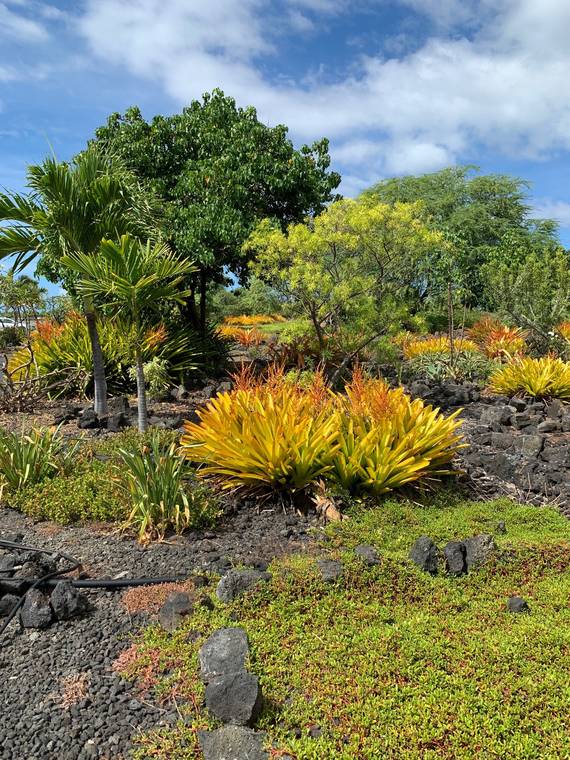As the days will shortly get longer folks like to brighten up their home with bouquets of colorful cut flowers, but for most kamaaina, living plants are another option. Instead of lasting a few days, many plants like cactus, succulents and bromeliads can last for years. If you like interior or exterior gardening the easy way, then you might consider a group of easy care plants often referred to cast iron plants. They are so tough that even if you don’t think you have a green thumb, you will have success with these tough guys.
To view a great display of the cast iron plants, visit the Community Gardens at the Old Kona Airport. According to a good friend, Kaz Shigezawa, about 25 years ago the State and members of the community worked together along with the Kona Outdoor Circle and Kona Lions Club to plant grass, monkeypods and coconut palms to beautify the barren site. In 2002 a volunteer group, Friends for Fitness were instrumental in adding a water fountain and exercise equipment along the meandering walking and jogging path. They became the stewards and coordinators. The Kona Rotary Club continued to supply manpower to further beautify the project and added resting spots. Today, Betty DeRoy is the Park Coordinator who may be contacted to get involved with planting and maintenance of the gardens. It takes an active team of folks to keep the area attractive so call Betty at 329-5519 to get involved. It is a great way to make friends, learn about new and unusual plants and maybe get some for your garden as well. During this terrible pandemic, it is a good way to get out of your bubble.
Now back let’s get back to the plants. Some of this group of unusual tropicals are even epiphytes attached to trees or lithophytes, meaning they will grow on rocks. The group includes many orchids, bromeliads and even some cacti that thrive high in the upper branches of the forest. Although epiphytes grow attached to shrubs and trees, they are not parasites, since they do not take their nutrients from the plants on which they grow. Many have some of the most beautiful flowers and unique foliage in the plant kingdom. They generally require less care than most other ornamentals. Many folks think air plants, succulents, lithophytes and cacti are difficult to grow but this is not the case. Our tropical climate is ideal for plants that are virtually impossible to grow outdoors anywhere else in the United States except in the subtropical parts of California and Florida. Here, many grow with almost no care.
Orchids, succulents, cactus and bromeliads are probably the most well known. They have the ability to store water and thus can take long periods without water. Many species have been introduced. All it takes is common sense, water and fertilizer. When buying, it is important to get healthy plants. Ask the grower or nurserymen about the particular species and its care. When grown in containers, they will require repotting every two or three years.
Fertilizers are specially formulated and when used according to directions will give excellent results. Disease and insect problems are few. If they do occur, our local garden supply dealers have fungicides and insecticides to quickly control the situation.
Give the air plants a try in your garden. Start with easy types such as bromeliads, like tillandias, billbergias, and aechmeas. Staghorn and resurrection ferns are easy. Dendrobiums, epidendrum and oncidiumorchids will thrive on a minimum of care. Local nurseries can give you quite a few ideas on the types to grow and ways to grow them.
Bromeliads, cactus and succulents may do with very little water or fertilizer.
Some folks worry that insects may breed in the center of bromeliads, especially mosquitos. These insects can be more than a nuisance since they may be vector for dengue fever and other diseases. That is why natural insect control with lizards, amphibians and birds makes good sense. It also makes the garden more interesting. Anole lizards, Jackson’s chameleons, geckos, especially the gold dust day gecko, and frogs add to the tropical magic of our gardens. Many common birds feed on insects, so including a bird feeder in the garden to attract them also adds benefit and beauty. To keep your bromeliads free of mosquitos, use a biological control that kills only the larvae. The tongue twister name is Bacillus thuringiensis subspecies israelensis. The easiest to use is granule form and sprinkling a few grains in the center every few weeks eliminates those pesky buggers. Flushing with water every two weeks or using natural insecticides like neem will also help keep your garden free of mosquitos.



